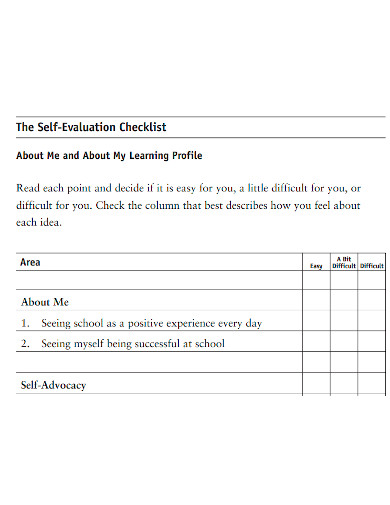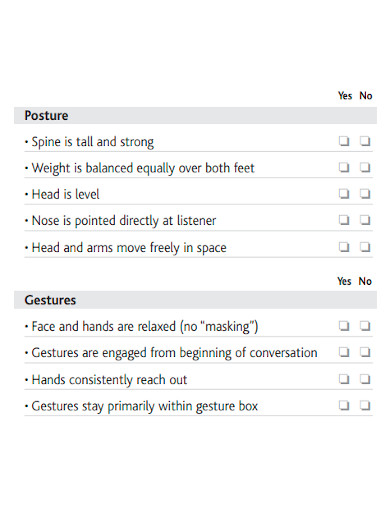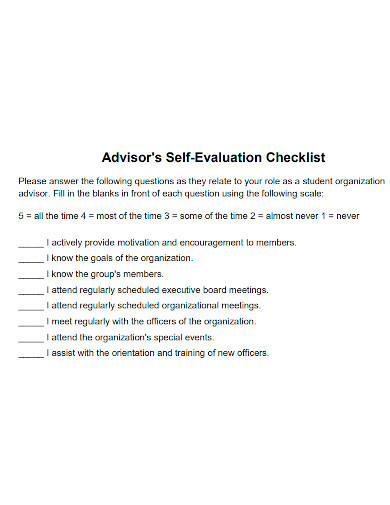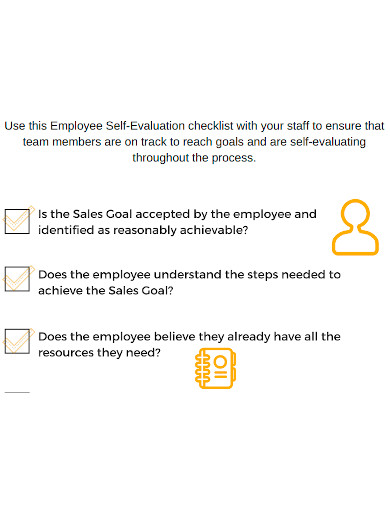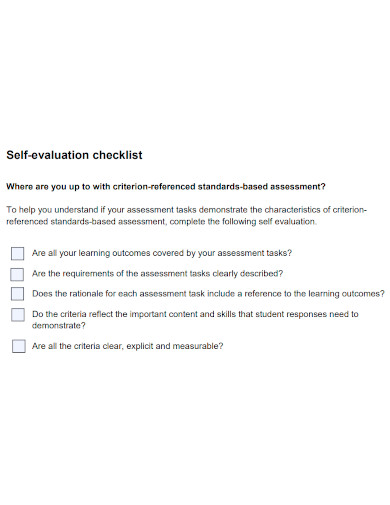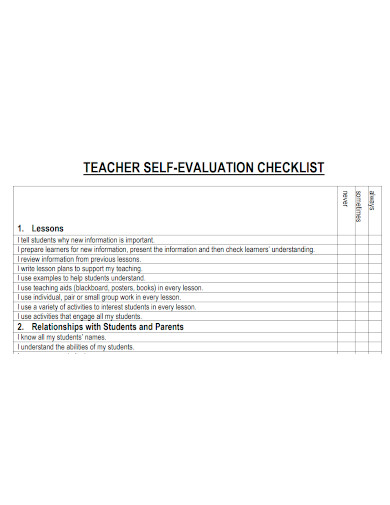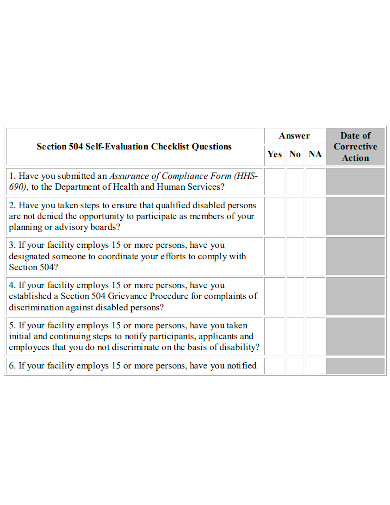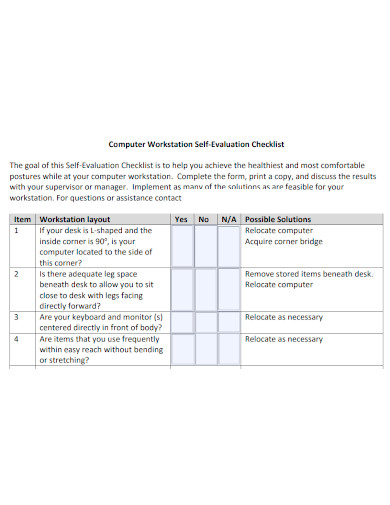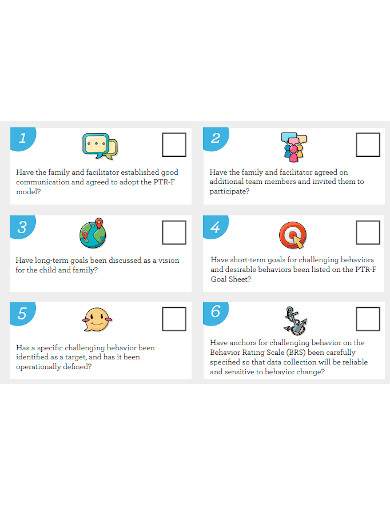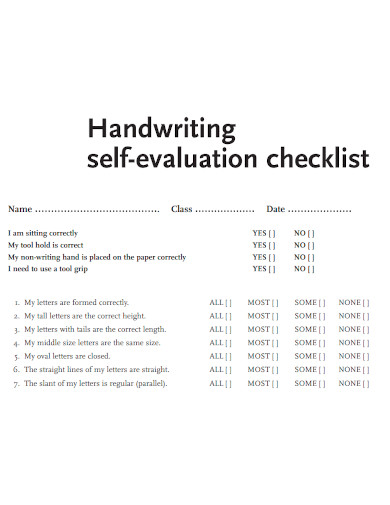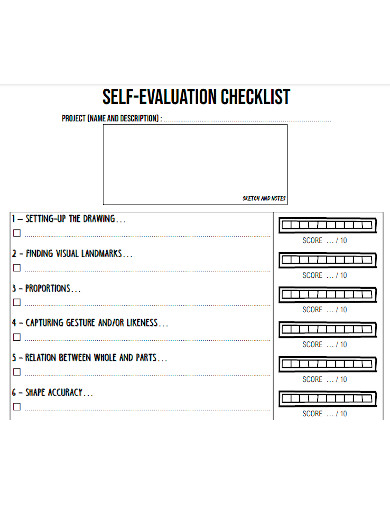H. James Harrington said: “Measurement is the first step that leads to control and eventually to improvement. If you can’t measure something, you can understand it. If you can’t understand it, you can’t control it. If you can’t control it, you can’t improve it.” Do you want to know more about how you are using your strengths to fulfill your goals and objectives? Are you honest concerning specific areas that you could refine more? In this article, we provide you with some helpful steps and a wide array of downloadable self-evaluation checklist templates so that you can monitor and turn the corner of your personal skills, abilities, attitudes, and performance as a student, teacher, employee, or any working professional. Keep on reading!
10+ Self-Evaluation Checklist Samples
1. Self-Evaluation Checklist Sample
2. Credibility Code Self-evaluation Checklist
3. Advisors Self-Evaluation Checklist
4. Employee Self-Evaluation Checklist
5. Printable Self-Evaluation Checklist
6. Teacher Self-Evaluation Checklist
7. Editable Self-Evaluation Checklist
8. Formal Self-Evaluation Checklist
9. Professional Self-Evaluation Checklist
10. Hand Writing Self-Evaluation Checklist
11. Strategic Self-Evaluation Checklist
What is a Self-Evaluation Checklist?
A self-evaluation checklist is a simple form that demonstrates rubrics and other structures that will be applied for thorough reflection and assessment of oneself. It is usually being used by many students, teachers, and schools, as well as professionals to support further growth and improvement in their skills and performance levels.
How to Create a Self-Evaluation Checklist
As self-evaluation gives you a clear picture of yourself, you need to rely on this so that you will understand and have a real awareness of yourself. Thus, self evaluation starts by making a comparison of your personal status, behavior, actions, ideas, skills, performance, and many more aspects along with the similar parameters in your past.
In this section, we highly suggest that you use our sample checklists for self-evaluation above that you can use conveniently. Here are the steps that work after you download your selected self-evaluation template:
1. Make a self-assessment
To make a self assessment, know about where you were in your past, where you are in the present, and where you will be in the near future. To deeply know yourself, you need to use these questions and ask yourself: What do I like? What is important to me? What are my specialties and strengths? These aspects will help you to improve your skills and overall character.
2. Analyze your interests and personality
Determine your specific interests so that you are able to select the right occupation, stream of study, subject area, or college to search for and you may want to pursue. Ask yourself: What do I enjoy? Then, know how you interact with different people around you. How do you develop your own decisions? These things will help you to reflect and analyze different aspects of your personality.
3. Identify your core skills and values
Look for your core skills or abilities and strengths that you acquired through diverse activities such as school, work, extracurricular and volunteer experiences, and hobbies. Become aware about the significant things that you perform well. Then, know about your personal life values like determining what are your priorities in your life.
4. Specify your beliefs
Your self-evaluation checklist should also specify your beliefs or positive or negative ideas and thoughts that you keep on yourself. These factors will influence the career goals you establish and the specific actions you will encounter in fulfilling your own goals.
5. Meditate and reflect on the things you need to change
Focus on the things you lack or simply, your weaknesses or some areas that you are having difficulties with. Take some time to meditate on them and reflect on how you will take some necessary measures to develop these skills and change your approach so that you will initiate self-transformation.
FAQs
First, analyze your personality and attitude. Think about your own ideas, thoughts, feelings, emotions, and opinions about your character, work performance, abilities, talents, strengths, skills, and weaknesses. Make an assessment of your performance according to the standards of your company, school, or organization. Also, consider asking for some feedback from other people.How do you make an evaluation of yourself?
A teacher can make a self-evaluation by monitoring his or her method of teaching. After each class, teachers should work on a short self evaluation form and check if they reached their prioritized goals and objectives. Then, make an evaluation of the good and the prospective factors that need to be improved next time.How can a teacher make a self-evaluation?
There are simple assessment strategies that you can perform such as using open-ended questions to help your students in writing or talking, asking them self-reflective questions, asking them to summarize, using response cards, using analogy prompt, etc.What are simple assessment strategies that you can perform?
Self-assessment is an effective and powerful tool to enhance learning and performance. It motivates students, teachers, managers, athletes, musicians, artists, and other people to reflect and analyze on how their respective work fulfills the goals and objectives established for learning different kinds of concepts and skills in their corresponding fields. Plus, it facilitates more practices for learning and development. Why is self-assessment effective?
According to the book “Success Through Self Evaluation: Think and Act Differently for Success”, self-evaluation is said to be accomplished when you become aware of your interests, personality traits, skills, values, and beliefs and also of your limitations and fears. By using these as references, you can produce your own interests, pave your own way in flying colors.
Additionally, you need to use your discretionary power and analytical skill prior to coming to conclusions. So, begin to think about your performance, achievement and other essential aspects concerning yourself as you get your self-evaluation checklist template today and continue to reach your goals in improving your personal and professional skills and performance.
Related Posts
FREE 10+ HR Assessment Checklist Samples
FREE 10+ Self Assessment Samples
FREE 9+ Sample Employee Self Evaluation Templates
FREE 8+ Sample Leadership Self Assessments
FREE 7+ Sample Self Evaluation Templates
FREE 6+ Sample School Self-Evaluation Forms
FREE 5+ Employee Self-Assessment Samples
FREE 4+ Coaching Skills Checklist Samples
FREE How to Fill Out a Self-Evaluation Form
FREE Dos in Writing Your Self-Evaluation [ 10+ Samples ]
FREE 57+ Evaluation Forms
FREE 18+ Group Evaluation Form Samples
FREE 9+ Sample Presentation Evaluation Forms
FREE 9+ Self Assessment Samples
FREE 8+ Self Assessment Samples

